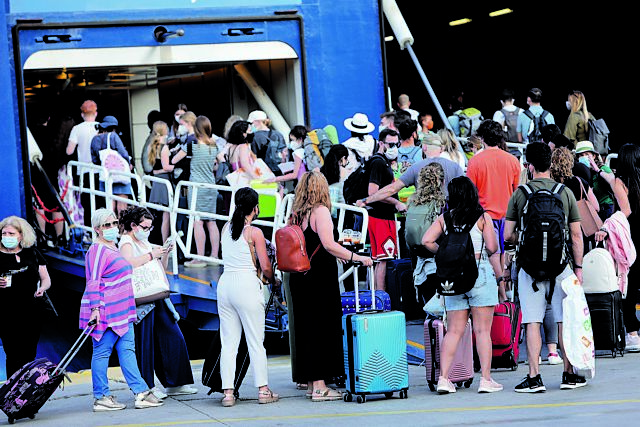Surge of Turkish Tourists Expected in 2025: The Impact of the Extended Express Visa Program
Introduction to a Promising Future
Starting on April 1, 2025, the North Aegean and Dodecanese islands are set to experience a significant influx of Turkish tourists. This promising surge is attributed to the one-year extension of the short-stay visa, more commonly referred to as the "express visa" program. As travel restrictions ease and tourism initiatives strengthen, local economies are poised to reap substantial benefits.
Expanding Horizons for Turkish Travelers
The express visa program is designed to simplify travel for Turkish citizens and their families, allowing them to access select Aegean islands with ease. Per the insights from the president of the Institute for Tourism Research and Forecasts (ITEP), this initiative is anticipated to enhance tourism significantly in these picturesque locales. With more effortless travel, more visitors are likely to explore the beautiful islands that dot the Aegean Sea.
Growing Support for a Permanent Program
As the express visa program demonstrates its effectiveness in drawing tourists, there is mounting support for making it a permanent fixture. The evidence is clear: more visitors mean more business for local tourism industries. However, tourism insiders emphasize the need for infrastructure enhancements to accommodate this uptick in visitors effectively. Without the necessary improvements, travelers could face challenges that detract from their experience.
A Shift in the Tourism Landscape
Data indicates that Turkish tourism has become a cornerstone for the economies of the North Aegean islands. The trend is shifting from short, day trips to longer stays averaging between three to five days. This change, largely facilitated by the express visa, has resulted in increased occupancy rates for hotels and heightened overall spending by tourists. This trend reflects a growing willingness among Turkish travelers to experience the region’s charm over extended durations.
Statistics Highlighting the Impact
Last year, a remarkable 104,700 visas were issued through the express visa program. Among these, around 37,000 visas were allocated for stays of three days, 21,500 for four days, and 22,000 for five to six days. In stark contrast, only 4,000 visas were issued for single-day visits. The overall statistics reveal that over 86,000 visas given were for stays of three days or longer, signifying a pronounced shift in traveler behavior.
Leading the Pack: Visa Approvals by Island
When breaking down the numbers of express visa approvals, it’s evident that Lesvos took the lead, issuing 27,600 visas. Following closely was Chios (Hios), which granted roughly 25,000 visas. Other islands such as Rhodes, Samos, and Kos also saw notable figures, with 16,000 and 8,600 visas, respectively.
Expansion of the Program
Initially, the express visa program covered five islands: Rhodes, Kos, Lesvos, Samos, and Chios. However, it has since undergone an expansion, now including additional destinations like Leros, Kalymnos, Kastellorizo, Symi, and Lemnos. These expansions cater to the growing demand for varied travel experiences and highlight the vibrant tapestry of the Greek islands.
Approval for Further Extension
Thanks to the diligent efforts of the Greek Ministry of Foreign Affairs, the European Commission has recently approved an extension of the program for another year. This extension, starting in April 2025, signifies confidence in the program’s success and its positive impact on both economies and tourism.
Newly Added Destinations
The expanded program has now embraced two more gems of the Aegean: Patmos and Samothraki, culminating in a total of 12 Greek islands covered under the express visa option. This broader inclusion means a greater array of experiences for Turkish tourists, ultimately enriching their travels.
Infrastructure: The Key to Success
While the express visa program is undeniably beneficial, experts remind stakeholders that infrastructure improvements are fundamental to enhancing the visitor experience. Upgrades in transportation, accommodations, and tourist facilities are essential to managing the expected tourist surge effectively.
Economic Prospects for Local Businesses
The anticipated increase in Turkish tourists is more than a boon for hotels; local businesses across food, entertainment, and retail sectors can expect a positive ripple effect. As tourists stay longer, they will explore regional cuisine, shop for souvenirs, and engage with local attractions, generating a substantial economic influx.
Building Cultural Bridges
The flow of Turkish tourists to the Aegean deepens cultural connections and fosters a spirit of camaraderie between the two nations. The Aegean islands, known for their stunning vistas and rich history, provide a backdrop for shared experiences and memories that will resonate across borders.
Sustainable Tourism: A Necessary Focus
As the local economies gear up for this anticipated influx, there must also be a keen focus on sustainable tourism practices. Ensuring that the growth in visitor numbers does not compromise the integrity and authenticity of these beautiful islands is essential for long-term success.
Preparing for the Future
As stakeholders and local governments brainstorm ways to improve visitor experiences, initiatives to increase services such as reliable transportation options and enhanced hospitality training for staff are likely to be prioritized. Preparatory measures will be crucial in reaping the benefits of this promising tourism boom.
Conclusion: Embracing New Opportunities
The anticipated rise in Turkish tourism to the North Aegean and Dodecanese islands comes at a pivotal moment for local economies. With the express visa program’s extension, the normalization of longer stays presents a unique opportunity for growth. As stakeholders lay the groundwork for accommodating this influx, they must remember that infrastructure improvements, sustainable practices, and cultural exchange will ultimately define the success of this initiative. Embracing these new opportunities will pave the way for a thriving future rooted in tourism and cultural unity.






















